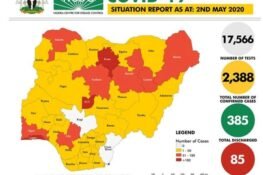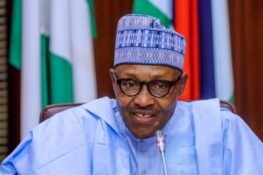Nigerian roads cannot be worse than they are today, unless we have returned to primitivity. Where can you travel to in Nigeria that would make you say, that was a smooth journey?
Who is that Nigerian who would just decide to go for a road trip? Nigerian roads are too treacherous, punishing and tortuous for anyone to enjoy. They are among the worst in the modern world.
Among the nations, Nigerians love debate; and argue heatedly about the condition of their country.
One subject I have rarely seen anyone argue about is the condition of the roads.
It is not subject to dissent or argument – they are just so incontrovertibly bad.
That is why it was a “wait-what?” moment when the Federal Minister of Works and Housing, Mr. Babatunde Fashola, stated that the roads are not as bad as we think.
Nigerians have been groaning and expecting that day when they can really travel, and hoped the minister would be the guy to fix it. The comments caught everyone by surprise.
Was the minister’s calculation that we can’t tell good from bad? George Orwell clearly demonstrated in Animal Farm that mental conditioning may cause the acceptance of a bad situation as normal.
When a scourge lingers for too long, it may be difficult to understand that things could be better.
In Nigeria, we have accepted a lot of our problems as a way of life and the people in government take advantage of it.
Nigerian roads are death traps, shameful gullies, dangerous contours and despicable constructions that anyone in government ought to be too ashamed of, to even talk about
While the citizens live with many depressing problems, it has been generally understood that the roads have become one of the most challenging problems for which a solution is simple.
The minister’s comments were not as well received as he had hoped.
While Mr. Fashola may have been misconstrued to some degree when the totality of his interview is considered, his central argument was that many roads have long stretches that are still motorable, which makes them sort of acceptable.
Here, the former governor got it wrong and preyed on the patience of the people. Those short portions are where Nigerians waste hours during their travel – and there are too many of such roads.
Mr. Fashola failed to sympathise with people who leave their homes in the middle of the night in order to get to work or other destinations early, and leave work when the roads are clear to get home in the middle of the night.
How about some sympathy for that man in Lagos State, who leaves his home in Ikorodu at 4am in order to get to work in Victoria Island? How about the woman in Sango Ota, who has through the minister’s entire political career had to sleep for just a few hours daily so that she can drop her children at school and still earn a living?
His Excellency fails to realise that journeys of a few hours have become a whole day’s dilemma just for the reasons he gave about a tiny fragment of halved roads.
Our people are living on the roads, inhaling dust and automotive emissions. And the man accountable fails to consider that the quality of life for road users has been reduced significantly.
How about some sympathy for that man in Lagos State, who leaves his home in Ikorodu at 4am in order to get to work in Victoria Island? How about the woman in Sango Ota, who has through the minister’s entire political career had to sleep for just a few hours daily so that she can drop her children at school and still earn a living?
Small issues have created a huge amount of problems.
Besides, it is difficult to agree with the minister that major roads are in good condition.
In Nigeria, inarguably, the most important road is the Lagos-Ibadan Expressway.
As the busiest inter-state route in Nigeria handling more than 250,000 vehicles daily, it is the artery of the road network, moving people from the most populous city to the rest of the nation.
This road was original completed in 1978. It had two lanes in each direction, stretching from Lagos to Ibadan, a total of 129.7 kilometers, with a connecting stretch to Benin and all of Eastern Nigeria.
The road from Lagos has been under reconstruction through four administrations for 20 years, and is still under construction today.
Money has been sunk into this project that has no end. On some portions of that prime road, vehicles grind to a total stop and hawkers push their goods through vehicle windows, a complete eye sore to the nation.
That is one of the roads that Mr. Fashola mentioned as okay.
Lagos, as the commercial capital of Nigeria, ought to have a direct and fast connection by road to the administrative capital, Abuja, which is only 697 kilometers away.
There is no direct road between the two locations and the options for travel are bad. The only safe and fast means of transportation is by air, which many Nigerians cannot afford.
Travel from Lagos to Abuja by road is a whole day’s journey. Google map estimates 11 hours and 45 minutes for less than 700 kilometers distance.
Just as the road from Lagos is deplorable, other important roads in Nigeria are in a deplorable condition, talk less neighborhood roads.
No matter where they go, Nigerians groan under daily inconveniences of road travel, going on for decades.
The roads are not only in a bad shape, they pose enormous security challenges. In some places, armed gangs attack motorists in daylight robberies at those broken stretches that Mr. Fashola considers negligible.
Most Nigerians with means avoid road travel altogether.
In Nigeria, we have accepted a lot of our problems as a way of life and the people in government take advantage of it. While the citizens live with many depressing problems, it has been generally understood that the roads have become one of the most challenging problems for which a solution is simple
Those who have can afford it travel by air only, while high rollers charter their own air transport, using planes and helicopters. Such Nigerians have been cut off from the realities of Nigerian road travel.
It is logical to assert that the Minister of Works and Housing, the man in charge of those bad roads, belongs to the class that avoids road travel. How else could he be so convinced?
There is no comparing Nigerian roads with the roads in countries that have earned money from oil, and Nigerian politicians know this.
Mr. Fashola made a completely unnecessary statement. One can only hope that it was a mere unforced error and that he did not truly believe that Nigerians have been well served by successive administrations.
It may be important to remind ourselves of how things should be under normal conditions.
From the 1920s, the Germans have been putting together a nationwide network of roads called the Autobahn. They consistently budgeted to build a national network of expansive roads.
By 2016, Germany’s autobahn network had a total length of about 12,993 km, some which have undergone massive widening and rehabilitation to expand the lane count.
Through the vision of its leaders, Germans now enjoy a federal road system where most sections have three or more lanes in each direction, in addition to an emergency lane.
There is no road in Nigeria that meets the international standard. Highways, such as autobahns or turnpikes are supposed connect major cities and provide a unique experience for long-distant driving, such that you have everything you need on the road and exit only at points of interest
Similarly, the United States created a massive web of highways connecting the whole nation through law.
Popularly known as the National Interstate and Defense Highways Act of 1956, the law established an interstate highway system stretching for over 48,000 thousand miles.
None of such plans exist in Nigeria, even now; and the maintenance culture that has differentiated most other countries from Nigeria is still lacking.
Nigerian roads are death traps, shameful gullies, dangerous contours and despicable constructions that anyone in government ought to be too ashamed of, to even talk about.
As he anticipated, Mr. Fashola got bold newspaper headlines calling him out, simply because he is out of touch with reality.
A number of organisations and individuals have also reacted commendably.
The Leadership and Accountability Initiate invited the minister to an all-expenses-paid nationwide road tour. Nigerians are also inviting him to visit their neighborhoods to experience the life that Fashola considers acceptable.
As Governor of Lagos State, Fashola made a name as an achiever. Many believe his vision brought a lot of positive changes to Nigeria’s commercial capital. That record recommended him for a federal ministerial post.
Nigeria has a lot of needs, and motorable roads are perhaps the greatest of them. I will share my own experience with Mr. Fashola.
I did not return to Nigeria for nine years after I left in 1996. During my first visit, I was so naïve.
I got a car from a friend and drove myself around. After some days, I returned the car to the owner.
On another trip, my sister’s van, which picked me up at the airport, fell into a roadside gully during a downpour in the suburbs of Alagbado, Lagos.
A group of people carried the vehicle out of its trap for money, in a dangerously earned salvage. I have since stopped driving myself in Nigeria. It is not worth it.
The driving experience goes beyond just tarred roads.
It involves standard sign specifications, toll booths, controlled access, street lights, minimal traffic lights, observing road signs, avoiding law enforcement extortion and roadside security.
There is no road in Nigeria that meets the international standard.
Highways, such as autobahns or turnpikes are supposed connect major cities and provide a unique experience for long-distant driving, such that you have everything you need on the road and exit only at points of interest.
Great nations have on their highways at predictable distances, rest areas where commuters can buy gas, refreshments and use public restrooms. Nigerian does not have these.
The good news for Mr. Fashola is that Nigerians are not even asking for a great travel experience.
All they want are roads with smooth surfaces. They have accepted all the other great stuff are not for this society.
Asking for motorable roads is not too much to ask from the government of one of the largest oil producing countries in the world.








